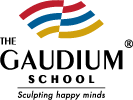International Baccalaureate (IB)
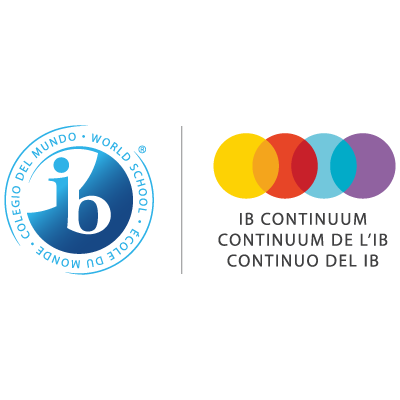
International Baccalaureate (IB)

International Baccalaureate Mission Statement
The International Baccalaureate aims to develop inquiring, knowledgeable and caring young people who help to create a better and more peaceful world through intercultural understanding and respect.
To this end the organization works with schools, governments and international organizations to develop challenging programmes of international education and rigorous assessment.
These programmes encourage students across the world to become active, compassionate and lifelong learners who understand that other people, with their differences, can also be right.
The Gaudium is now an IB Continuum School
The Gaudium has always been the gold standard in school education be it in curriculum, infrastructure, teaching, or creativity. Now we’ve added more sheen to our crown by becoming a prestigious IB CONTINUUM SCHOOL. What this means is, we are one among a handful of IB WORLD SCHOOLS in Hyderabad to offer IB PYP, IB MYP and IB DP – the continuum of programmes necessary to foster academic excellence, character building, multilingualism, intercultural understanding and global engagement. We dedicate this stellar accomplishment to our wonderful family of teachers, parents, and students who’ve been with us every step of the way in our relentless march forward. Our pursuit of excellence will continue in the CBSE and Cambridge curricula. Come, be a part of our journey to stay ahead in education.
International Baccalaureate Mission Statement
The International Baccalaureate aims to develop inquiring, knowledgeable and caring young people who help to create a better and more peaceful world through intercultural understanding and respect.
To this end the organization works with schools, governments and international organizations to develop challenging programmes of international education and rigorous assessment.
These programmes encourage students across the world to become active, compassionate and lifelong learners who understand that other people, with their differences, can also be right.
The Gaudium is now an IB Continuum School
The Gaudium has always been the gold standard in school education be it in curriculum, infrastructure, teaching, or creativity. Now we’ve added more sheen to our crown by becoming a prestigious IB CONTINUUM SCHOOL. What this means is, we are one among a handful of IB WORLD SCHOOLS in Hyderabad to offer IB PYP, IB MYP and IB DP – the continuum of programmes necessary to foster academic excellence, character building, multilingualism, intercultural understanding and global engagement. We dedicate this stellar accomplishment to our wonderful family of teachers, parents, and students who’ve been with us every step of the way in our relentless march forward. Our pursuit of excellence will continue in the CBSE and Cambridge curricula. Come, be a part of our journey to stay ahead in education.
IB Primary Years Programme (IB PYP)
The IB Primary Years Programme (PYP) for children aged 3 – 12 nurtures and develops young students as caring, active participants in a lifelong journey of learning. The PYP offers an inquiry-based, transdisciplinary curriculum framework that builds conceptual understanding
The PYP model espouses transdisciplinary learning, but at the same time it acknowledges that it is necessary for students to gain basic understanding and skills in the disciplines to support knowledge integration. The PYP nurtures independent and collaborative learners, encouraging them to have voice, choice and ownership in their own learning. The students develop knowledge, conceptual understanding, skills and the attributes of the IB Learner profile to make a positive difference in their own lives and the world around.
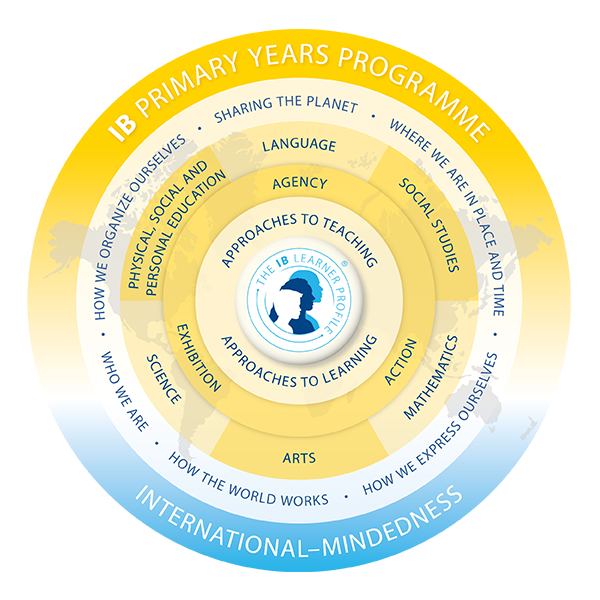
The students demonstrate the agility and imagination to respond to new and unexpected challenges and opportunities and take action for a better and more peaceful world. It offers an inquiry-based and concept-driven transdisciplinary model of learning and teaching, supported by an understanding of how students learn.
The students encapsulate their shared commonalities and engage in dialogues about real issues in the world through the six transdisciplinary themes– Who we are, How we express ourselves, Where we are in place and time, How we organize ourselves, How the world works, and Sharing the planet. Through subjects, students learn to appreciate the “ways of knowing”—the modes of thought and communication associated with a subject.
Subjects being offered in the IBPYP are:
- Language
- Mathematics
- Science
- Social Studies
- Arts
- Physical, social and personal education
IB Primary Years Programme (IB PYP)
The IB Primary Years Programme (PYP) for children aged 3 – 12 nurtures and develops young students as caring, active participants in a lifelong journey of learning. The PYP offers an inquiry-based, transdisciplinary curriculum framework that builds conceptual understanding
The PYP model espouses transdisciplinary learning, but at the same time it acknowledges that it is necessary for students to gain basic understanding and skills in the disciplines to support knowledge integration. The PYP nurtures independent and collaborative learners, encouraging them to have voice, choice and ownership in their own learning. The students develop knowledge, conceptual understanding, skills and the attributes of the IB Learner profile to make a positive difference in their own lives and the world around.

The students demonstrate the agility and imagination to respond to new and unexpected challenges and opportunities and take action for a better and more peaceful world. It offers an inquiry-based and concept-driven transdisciplinary model of learning and teaching, supported by an understanding of how students learn.
The students encapsulate their shared commonalities and engage in dialogues about real issues in the world through the six transdisciplinary themes– Who we are, How we express ourselves, Where we are in place and time, How we organize ourselves, How the world works, and Sharing the planet. Through subjects, students learn to appreciate the “ways of knowing”—the modes of thought and communication associated with a subject.
Subjects being offered in the IBPYP are:
- Language
- Mathematics
- Science
- Social Studies
- Arts
- Physical, social and personal education
IB Middle Years Programme (IB MYP)
The IB Middle Years Programme (IB MYP*) is a five-year programme with a comprehensive curriculum framework that provides academic challenge and develops the life skills of students from the ages of 11 to 16 years old. It encourages students to make practical connections between their learning and the real world through various learning and teaching strategies used in the class. Our school’s philosophy is integrated with the IB philosophy to create a challenging and joyful learning environment for our students. It is accomplished through the Gaudium’s Happy Minds model which rests on the five pillars. This process enables our students to be self-motivated learners who take responsibility for their learning to achieve their personal best. At Gaudium, students are at the center of learning and we constantly work towards creating global leaders who are internationally minded by unlocking their potential and unleashing their creativity.
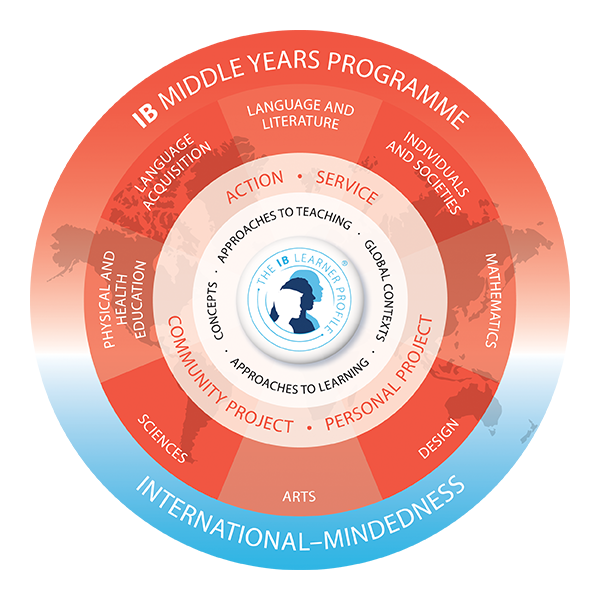
At Gaudium, we motivate learners to achieve success in school and in life beyond the four walls of the classroom. Our students develop and demonstrate their knowledge and understanding through:
IB Middle Years Programme (IB MYP)
The IB Middle Years Programme (IB MYP*) is a five-year programme with a comprehensive curriculum framework that provides academic challenge and develops the life skills of students from the ages of 11 to 16 years old. It encourages students to make practical connections between their learning and the real world through various learning and teaching strategies used in the class. Our school’s philosophy is integrated with the IB philosophy to create a challenging and joyful learning environment for our students. It is accomplished through the Gaudium’s Happy Minds model which rests on the five pillars. This process enables our students to be self-motivated learners who take responsibility for their learning to achieve their personal best. At Gaudium, students are at the center of learning and we constantly work towards creating global leaders who are internationally minded by unlocking their potential and unleashing their creativity.

At Gaudium, we motivate learners to achieve success in school and in life beyond the four walls of the classroom. Our students develop and demonstrate their knowledge and understanding through:
IB Diploma Programme (IB DP)
The International Baccalaureate Diploma Programme (IBDP) is a two-year educational programme for ages 16-to-19-year-olds in 140 countries around the world. The programme provides an internationally accepted and acclaimed qualification for entry into higher education and is recognized by universities worldwide. Through the Diploma Programme (DP) core, students reflect on the nature of knowledge, complete independent research and undertake a project that often involves community service. The integration of school philosophy with the IB philosophy testifies the fact that our DP students are open-minded, self-reflective, caring individuals who balance both academic and non-academic activities well and grow up to be responsible global citizens.
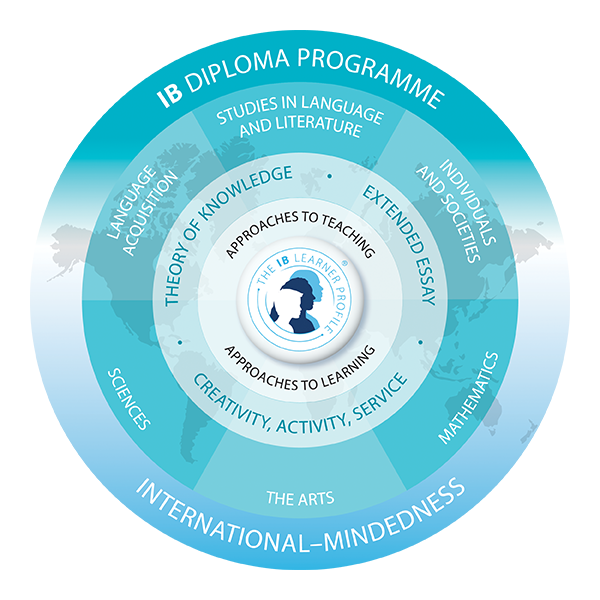
In the DP, the curriculum consists of six subject groups and the three elements of the DP core. As one of these core elements, the theory of knowledge (TOK) course encourages students to become more aware of their own perspectives and assumptions through an exploration of the fundamental question of how we know what we know.
The six bands of subjects offered at The Gaudium are:
- Band 1 – English A: Language and Literature HL/SL
- Band 2 – French B SL, Spanish ab SL, Hindi B SL, Spanish B SL, French ab SL*
- Band 3 – Computer Science HL/SL, Biology HL/SL, Environmental Systems and Societies (ESS) SL, Business Management HL/SL, Design Technology * HL/SL
- Band 4 – Chemistry HL/SL, Economics HL/SL, Global Politics * HL/SL
- Band 5 – Mathematics Analysis and Approaches HL/SL, Mathematics Applications and Interpretation HL/SL
- Band 6 – Psychology HL/SL, Physics HL/SL, Visual Art * HL/SL, Business Management HL/SL
HL- High Level | SL- Standard Level |Ab- Ab Initio
Note:
1. Students must choose one subject from each subject group.
2. Students must opt for 3 subjects at HL and other three at SL.
3. All DP students must complete 3 core components: Creativity Activity Service (CAS),
Extended Essay (EE) and Theory of Knowledge (TOK).
4. * Subjects will be offered only if there are more than 12 (Twelve) students.
The Diploma Programme features three core elements that broaden students’ educational experience and challenge them to apply their knowledge and skills:
Assessments
In accordance with IB, we at The Gaudium ensure that assessment philosophy, policy and procedures are best communicated to the stakeholders and provide students with feedback to inform and improve their learning.
- In DP year 1, students appear for 2 Unit tests (Formative) and 2 Semester (Summative) exams
- In DP year 2 students appear for 1 Unit test (Formative) and 1 Semester (Summative) exam followed by 2 pre-board exams before the year culminates with the board exams
Each formal summative assessment is designed to contribute to the final diploma qualification. Most of these are externally assessed so we ensure that the internal assessments are standardised through various in-house methods.
To qualify for the Diploma programme, student study:
- 3 subjects at higher level (HL), 3 subjects at standard level (SL)
- For those with limited or no experience of an available second language, ab initio courses are available.
The dynamic DP teachers, rather than being just a transmitter of knowledge, support student learning by making use of questions and tasks that help the student work. The Approaches to teaching and learning at The Gaudium are aligned with the IB aim of creating a supportive environment for learning to happen. Few salient features of ATL are:
- Inquiry based
- Constructivist
- PBL- Project based and Problem based learning.
- Intensive reading Programmes
- Concept and context driven approach
IB Diploma Programme (IB DP)
The International Baccalaureate Diploma Programme (IBDP) is a two-year educational programme for ages 16-to-19-year-olds in 140 countries around the world. The programme provides an internationally accepted and acclaimed qualification for entry into higher education and is recognized by universities worldwide. Through the Diploma Programme (DP) core, students reflect on the nature of knowledge, complete independent research and undertake a project that often involves community service. The integration of school philosophy with the IB philosophy testifies the fact that our DP students are open-minded, self-reflective, caring individuals who balance both academic and non-academic activities well and grow up to be responsible global citizens.

In the DP, the curriculum consists of six subject groups and the three elements of the DP core. As one of these core elements, the theory of knowledge (TOK) course encourages students to become more aware of their own perspectives and assumptions through an exploration of the fundamental question of how we know what we know.
The six bands of subjects offered at The Gaudium are:
- Band 1 – English A: Language and Literature HL/SL
- Band 2 – French B SL, Spanish ab SL, Hindi B SL, Spanish B SL, French ab SL*
- Band 3 – Computer Science HL/SL, Biology HL/SL, Environmental Systems and Societies (ESS) SL, Business Management HL/SL, Design Technology * HL/SL
- Band 4 – Chemistry HL/SL, Economics HL/SL, Global Politics * HL/SL
- Band 5 – Mathematics Analysis and Approaches HL/SL, Mathematics Applications and Interpretation HL/SL
- Band 6 – Psychology HL/SL, Physics HL/SL, Visual Art * HL/SL, Business Management HL/SL
HL- High Level | SL- Standard Level |Ab- Ab Initio
Note:
1. Students must choose one subject from each subject group.
2. Students must opt for 3 subjects at HL and other three at SL.
3. All DP students must complete 3 core components: Creativity Activity Service (CAS),
Extended Essay (EE) and Theory of Knowledge (TOK).
4. * Subjects will be offered only if there are more than 12 (Twelve) students.
The Diploma Programme features three core elements that broaden students’ educational experience and challenge them to apply their knowledge and skills:
Assessments
In accordance with IB, we at The Gaudium ensure that assessment philosophy, policy and procedures are best communicated to the stakeholders and provide students with feedback to inform and improve their learning.
- In DP year 1, students appear for 2 Unit tests (Formative) and 2 Semester (Summative) exams
- In DP year 2 students appear for 1 Unit test (Formative) and 1 Semester (Summative) exam followed by 2 pre-board exams before the year culminates with the board exams
Each formal summative assessment is designed to contribute to the final diploma qualification. Most of these are externally assessed so we ensure that the internal assessments are standardised through various in-house methods.
To qualify for the Diploma programme, student study:
- 3 subjects at higher level (HL), 3 subjects at standard level (SL)
- For those with limited or no experience of an available second language, ab initio courses are available.
The dynamic DP teachers, rather than being just a transmitter of knowledge, support student learning by making use of questions and tasks that help the student work. The Approaches to teaching and learning at The Gaudium are aligned with the IB aim of creating a supportive environment for learning to happen. Few salient features of ATL are:
- Inquiry based
- Constructivist
- PBL- Project based and Problem based learning.
- Intensive reading Programmes
- Concept and context driven approach
